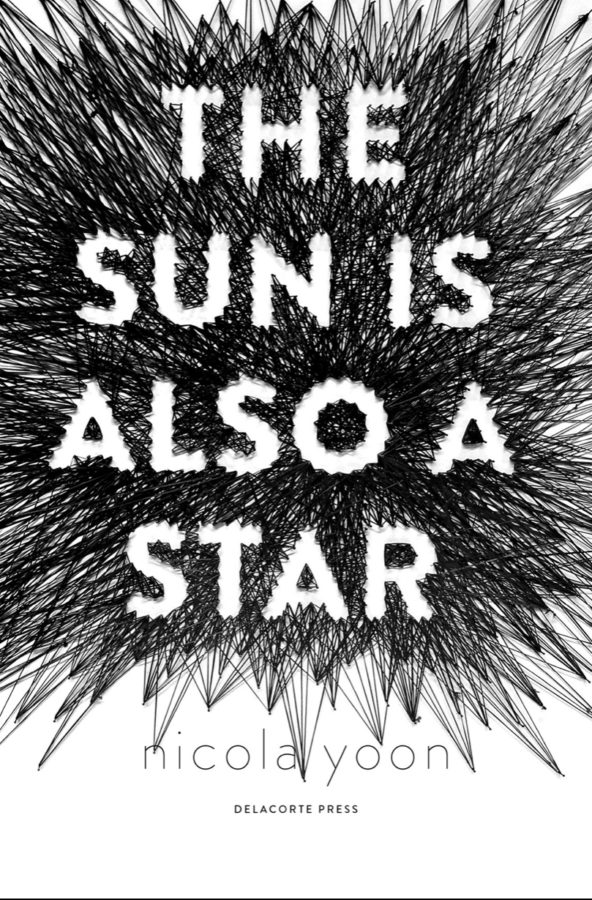“The Sun is Also A Star” is a huge cliché and it’s aware
May 17, 2019
The movie adaptation of Nicola Yoon’s “The Sun is Also A Star” hit theaters today. In lieu of this, here’s my take on the book, because you have to read it at some point either before or after the movie (preferably before–yes, I’m one of those).
The book chronicles a day in the life of Natasha and Daniel. Told from multiple viewpoints, each character gets to share their own first-person narration of the day’s events, with the occasional reprieve from minor characters (mostly strangers) and subjects such as “love” and “hair” told from a third-person narrator’s perspective. Natasha, a Jamaican immigrant on the cusp of deportation, is only trying to find a lawyer so her family doesn’t have to leave the US by the end of the day. Daniel, a Korean-American born in the US, is on his way to a college interview when fate brings him to Natasha. After that, sparks fly and a series of coincidences and decisions keep ensuring the two’s paths continue to cross.
When I first started reading “The Sun is Also A Star,” I really wanted to hate it–truly. For starters, it’s a giant cliche about two high schoolers falling in love and in a matter of hours no less (please), but there is something absolutely infectious about Yoon’s writing style which pulls you in and doesn’t let you go.
A major factor in the book’s allure is the intermittent, random chapters told from the third person narrator’s point of view. This narrator is matter-of-fact in a witty way, and the short stories told are captivating. They’re extremely real, and not at all pleasing. Talking of suicide, divorce and death, Yoon did not shy away from serious topics, and she made all these strangers lives connect in some manner, putting life in perspective. Everyone somewhere is going through a rough patch, and Yoon demonstrated this point perfectly.
Yoon even branched out into multiple genres within the book, with a chapter written in play scripted format, a few chapters consisting of Daniel’s poetry and a journalistic take with Daniel’s constant pension for making his life into a newspaper headline.
Additionally, as an author, Yoon went into the novel intending to play off of cliches and stereotypes and my goodness did she make it work. She has Natasha and Daniel point out the stereotypes they’re faced with, she recognizes the fact that Daniel, on first look, appeared like a stalker with openness. In fact, Yoon uses the stereotypes (Asian parents want their kids to be doctors and Jamaicans always say irie) to further the plot by having Natasha and Daniel talk about them. Besides, at the end of the day, many stereotypes have been labeled as such because of their commonality, and Yoon gives background and motivation behind the viewpoints, at least for these cases, which adds an extra layer of depth to the novel.
With very short chapters ranging from less than a page to around six pages, this book is a fast read, and the fact that each character switches off chapters makes you continue the reading experience to find out their reactions and storylines. Yoon is also able to get into the nitty gritty factors of being of non-American descent and living in America. She depicts the struggle between being an American and not feeling like one (Daniel), and being Jamaican, yet wanting nothing more than to be an American (Natasha). This book gets surprisingly deep about very serious issues immigrants and their children struggle with.
Furthermore, as storytellers, Natasha and Daniel, are differing and enrapturing. When writing from multiple points of view, it can be hard to distinguish between the different characters in a book, but even without reading the chapter titles (which were the names of the character narrating or topic being spoken about), it was clear who was speaking based on personality. Daniel was a sweet, innocent and idealistic high-schooler who was also really self-aware and down-to-earth for someone his age (and gender), while Natasha was an extremely precise, scientific, everything-has-cause type of person with a dash of cynicism. It was entertaining to see their interactions and get into their respective minds while watching these polar opposites fall for each other.
Of course, the ending can’t go without mention, as many a times with books, they’re not pleasing to the reader. This one was any mushy-hearted soul’s dream. It’s very lovey dovey (not at all my cup of tea) and so cliché. yet I can’t help but love that Yoon stayed true to form all the way up and through the end of the book.
The only bad thing about the book is that it’s completely and utterly unreasonable. Never in a million years would this happen, but that’s also Yoon’s point: expect the unexpected. Anything can happen. Coincidences are real and chance rules the world.
As Natasha would put it, “Observable fact:” “The Sun is Also A Star” is a must-read.

